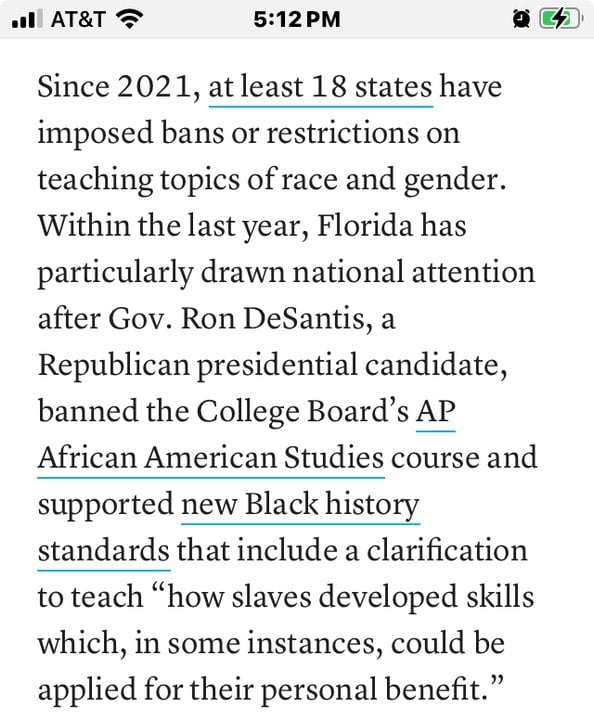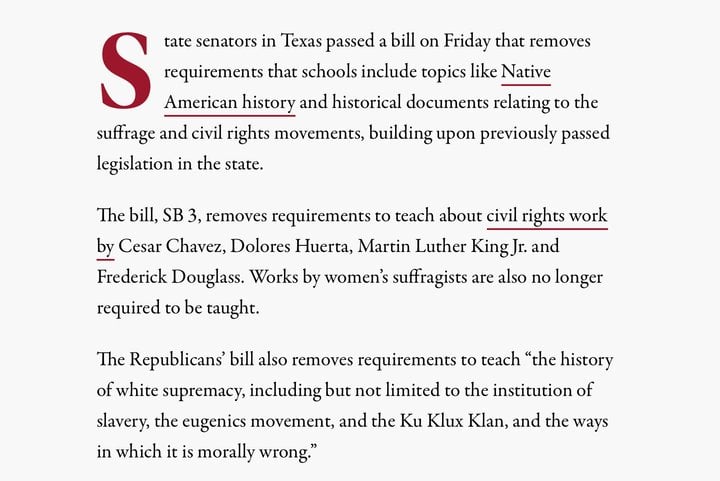This page is a permanent link to the reply below and its nested replies. See all post replies »
bijouxbroussard · F
Mainly because to not have to is a privilege or luxury not available to everyone.
TangledUpInBlue · F
@bijouxbroussard that’s a good answer, however don’t you think that constant trauma culture makes for lack of open conversations and honesty?
bijouxbroussard · F
@TangledUpInBlue I think the problem is some people thinking 50 years should’ve been enough time to fix 350 years of constant trauma, and they’re tired of hearing about it, so they want to rewrite the narrative.
That’s not reasonable. 🥺
That’s not reasonable. 🥺
TangledUpInBlue · F
@bijouxbroussard That’s interesting, because I asked a general question. The fact that it jumped straight to slavery kind of reinforces the idea that everything now gets filtered through the same few identity narratives. That’s exactly what I’m talking about. Like they ..who is they.
bijouxbroussard · F
@TangledUpInBlue If Reconstruction had been the end of that story, then things might be different now.
But there was the aftermath;
Jim Crow (our equivalent of apartheid), the lynchings, the redlinings, the relationship with law enforcement, the mainstream medical establishment, all still problematic.
And that’s just one community.
If you look at the indigenous people, that’s even longer ago.
But ICE, thinking brown skin means "undocumented" have already stopped people with ancestry here dating back thousands of years.
We can’t bury this. And we can’t hide from the history because people are afraid of their children’s possible hurt feelings.
Nobody who slaughtered our indigenous people or enslaved African people in the U.S. is still alive.
But the people banning history books and trying to stop this from being taught about in schools, are here.🤨
But there was the aftermath;
Jim Crow (our equivalent of apartheid), the lynchings, the redlinings, the relationship with law enforcement, the mainstream medical establishment, all still problematic.
And that’s just one community.
If you look at the indigenous people, that’s even longer ago.
But ICE, thinking brown skin means "undocumented" have already stopped people with ancestry here dating back thousands of years.
We can’t bury this. And we can’t hide from the history because people are afraid of their children’s possible hurt feelings.
Nobody who slaughtered our indigenous people or enslaved African people in the U.S. is still alive.
But the people banning history books and trying to stop this from being taught about in schools, are here.🤨
TangledUpInBlue · F
@bijouxbroussard I’m not denying the weight of that history,it matters. But the fact that a general question about how people see the world immediately turned into a specific narrative about U.S. racial history kind of proves the point don’t you think? It seems we’ve lost the ability to talk about cultural trends without everything being framed through trauma or identity politics. That seems limiting. I dunno perhaps I’m wrong, it just seems that way. Or perhaps it’s always been that way. What history books are being banned in your country? What do you think?
bijouxbroussard · F
@TangledUpInBlue I admit I don’t understand the term "identity politics". And trauma is still a day to day reality for a lot of people, and one ignores that at their own peril. Once you stop teaching people about the past, they can’t understand the perspectives of those of us still alive who lived it.
I remember the signs "whites only" and "colored only" that I saw as a child, visiting family down south. But recently, a young man asserted that "blacks discriminated too, they had ‘black only’ schools". I had to explain to him that HBCUs were founded by whites, because many of the other schools didn’t allow blacks to attend. 🙄
Here’s a couple of examples of what has been done by some of the school districts in parts of the U.S., mostly in MAGA areas.
I remember the signs "whites only" and "colored only" that I saw as a child, visiting family down south. But recently, a young man asserted that "blacks discriminated too, they had ‘black only’ schools". I had to explain to him that HBCUs were founded by whites, because many of the other schools didn’t allow blacks to attend. 🙄
Here’s a couple of examples of what has been done by some of the school districts in parts of the U.S., mostly in MAGA areas.
TangledUpInBlue · F
@bijouxbroussard that’s white washing history though and it’s wrong I absolutely agree. I understand what you’re saying however. My concern is more about how often these discussions get stuck only in that frame, even when we start from a broader question. It can make open, nuanced conversation harder, not easier. And I’m not specifically targeting slavery or any injustices of the past, my question was more to do with throwing everything under the lense of identity and politics. How far does it go? I asked from a completely neutral perspective.
bijouxbroussard · F
@TangledUpInBlue I understand. It’s very different here, and more so recently. Just about everything has a political slant; and rarely is neutrality assumed. One can comment to a stranger about the weather and end up being scolded about "climate change fanatics".
TangledUpInBlue · F
@bijouxbroussard Neutrality seems to have become a rarity. Social media doesn’t help as platforms seem to care more about engagement than true discussions. ‘I’s my tribe against your tribe’ is the ongoing rhetoric. It should’ve been the other way around in my opinion. I accept that there is no such thing as true neutrality - however people can at least try. All of us..can try and practice non political listening and give ourselves media diets from time to time.
bijouxbroussard · F
@TangledUpInBlue That gets back to what I said initially—it’s not a luxury available to everyone. After a lifetime of trying I observe before I engage.





